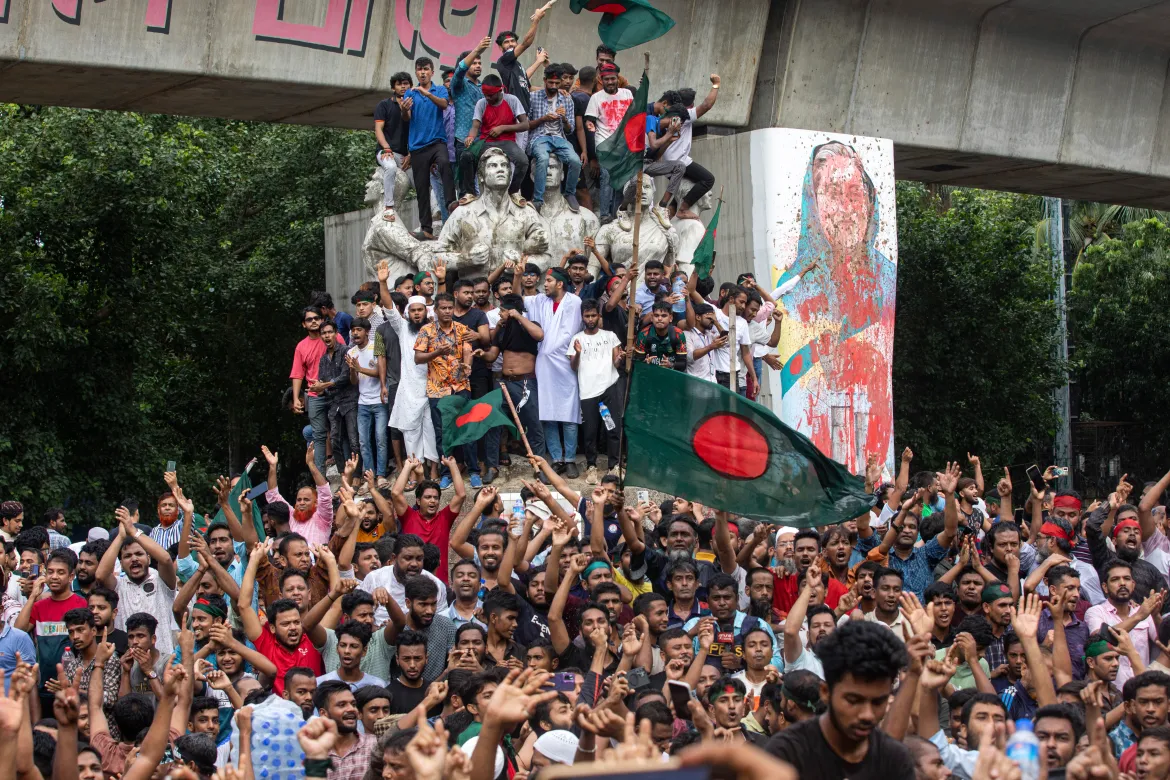Thousands Rally Across Bangladesh to Mark Anniversary
Dhaka, Bangladesh – Thousands of people took to the streets across Bangladesh this week to mark the first anniversary of the fall of former Prime Minister Sheikh Hasina Wazed’s government. What began as a political transition has turned into a day of public celebration for many, symbolizing what protestors call a return to democratic hope.
In Dhaka, the nation’s capital, as well as in other major cities like Chittagong and Khulna, rallies and public gatherings were held, where citizens waved flags, chanted slogans, and expressed joy over what they view as the end of an era marked by authoritarianism and political suppression.
Celebrations with a Political Undertone
Although the events were peaceful, the tone was unmistakably political. Participants applauded the current interim administration for what they see as steps toward transparency and inclusivity in governance.
International media covering the events reported a generally festive mood, but one that carried deep political undercurrents. Protesters held signs demanding justice for past political oppression, and called for continued reforms.
Interim Government Pledges Transparent Elections
In a public address marking the occasion, interim government head Mohammad Yunus assured the nation that his administration is committed to ensuring free, fair, and peaceful elections in the coming year.
“Bangladesh must move forward by bringing all political and social forces together,” Yunus said. “We are making full preparations to hold transparent elections so that the people can choose their representatives without fear or pressure.”
His remarks reflect the transitional government’s broader efforts to restore public confidence in democratic institutions, which many felt were eroded under Hasina’s long-standing rule.
Legal and Diplomatic Moves Against Sheikh Hasina
While the country looks ahead to elections, the interim government is also reportedly exploring legal and diplomatic options to bring Sheikh Hasina back from India, where she is currently residing.
According to official sources, authorities are reviewing potential avenues to ensure that the former Prime Minister is held accountable for alleged financial and political corruption, with multiple cases still open in Bangladesh.
Although no formal extradition request has been confirmed, the government appears keen on signaling that no political figure is above the law.
Controversial Legacy of Sheikh Hasina
Sheikh Hasina’s tenure as Prime Minister was deeply polarizing. While her supporters credited her with economic growth and infrastructural development, critics accused her of:
-
Election rigging and vote manipulation
-
Crackdowns on opposition parties and dissent
-
Heavy media censorship
-
Favouritism towards India, especially in foreign policy and trade deals
These accusations led to widespread public dissatisfaction and repeated protests during her final years in office. The pressure eventually culminated in her government’s collapse, following a wave of mass protests and political defections one year ago.
Public Sentiment Shifting Toward Accountability
Many Bangladeshis see the anniversary not just as a celebration, but as a turning point in their country’s political journey. Civil society organizations, journalists, and political observers have welcomed the interim government’s tone, but also warned that words must now translate into action.
Protesters at the rallies voiced a shared hope: that the upcoming elections will not repeat the past. Some also referred to policies affecting everyday life — from unemployment to press freedom — as areas where concrete progress is urgently needed.
Related Reading: Power and Policy in South Asia
The transition in Bangladesh also has implications for regional politics, particularly India–Bangladesh relations, which came under scrutiny during Hasina’s tenure. Her government’s perceived alignment with New Delhi often sparked criticism at home.
For deeper insights into how Bangladesh’s electricity subsidy policies and economic changes are affecting citizens, especially in post-Hasina governance, read:
Looking Ahead
As the nation marks one year without Sheikh Hasina at the helm, questions remain about what comes next for Bangladesh. The interim government has a narrow window to prove its intentions through credible electoral reforms, institutional accountability, and justice for past abuses.
Until then, the streets of Dhaka echo with a powerful message — one of hope, reflection, and a collective demand for democratic renewal.















